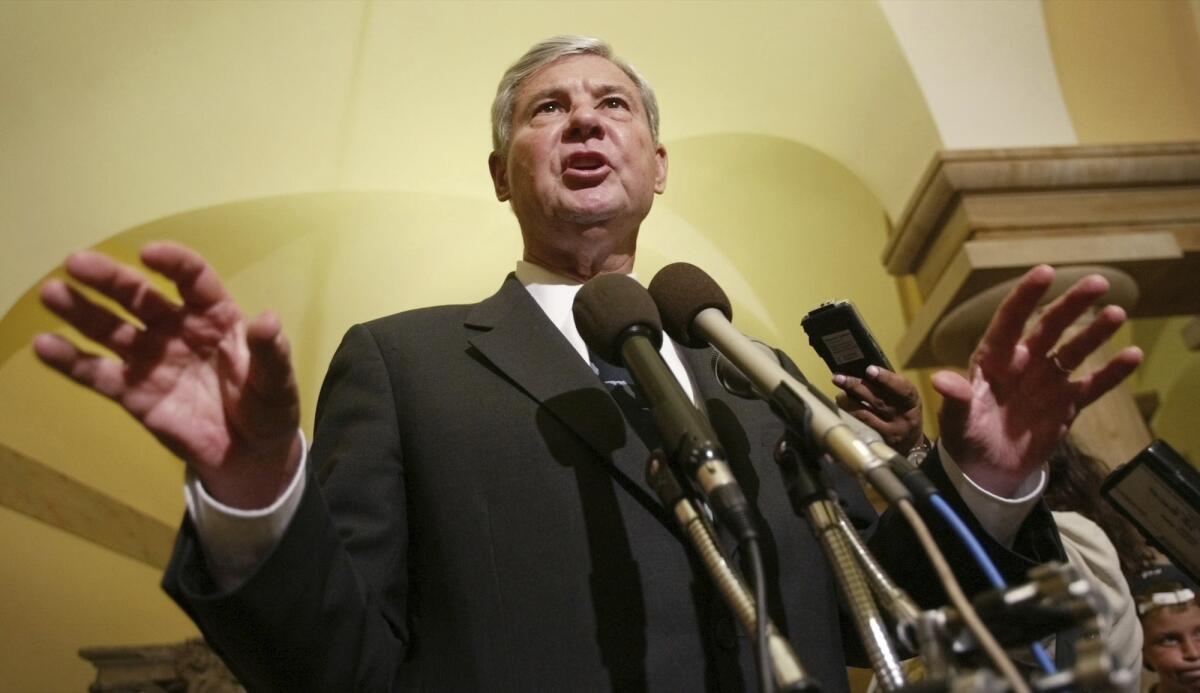Bob Graham, former U.S. senator and Florida governor, dies at 87

- Share via
TALLAHASSEE, Fla. — Former U.S. senator and two-term Florida Gov. Bob Graham, who gained national prominence as chairman of the Senate Intelligence Committee in the aftermath of the 2001 terrorist attacks and as an early critic of the Iraq war, has died. He was 87.
Graham’s family announced the death Tuesday in a statement posted on X by his daughter Gwen Graham.
“We are deeply saddened to report the passing of a visionary leader, dedicated public servant, and even more importantly, a loving husband, father, grandfather, and great-grandfather,” the family said.
Graham, who served three terms in the Senate, made an unsuccessful bid for the 2004 Democratic presidential nomination, emphasizing his opposition to the U.S.-led invasion of Iraq.
His bid was delayed by heart surgery in January 2003, and he was never able to gain enough traction with voters to catch up, bowing out that October. He didn’t seek reelection in 2004 and was replaced by Republican Mel Martinez.
Graham was a man of many quirks. He perfected the “workdays” political gimmick of spending a day doing various jobs, from horse stall mucker to FBI agent, and kept a meticulous diary, noting almost everyone he spoke with, everything he ate, the TV shows he watched and even his golf scores.
Graham said the notebooks were a working tool for him and he was reluctant to describe his emotions or personal feelings in them.
“I review them for calls to be made, memos to be dictated, meetings I want to follow up on and things people promise to do,” he said.
Graham was among the earliest opponents of the Iraq war, saying it diverted America’s focus on the battle against terrorism centered in Afghanistan. He was also critical of President George W. Bush for failing to have an occupation plan in Iraq after the U.S. military threw out Saddam Hussein in 2003.
Graham said Bush took the United States into the war by exaggerating claims of the danger presented by the Iraqi weapons of mass destruction that were never found. He said Bush distorted intelligence data and argued that it was more serious than the sexual misconduct issues that led the House to impeach President Clinton in the late 1990s. It prompted him to launch his short, abortive presidential bid.
“The quagmire in Iraq is a distraction that the Bush administration, and the Bush administration alone, has created,” Graham said in 2003.
During his 18 years in Washington, Graham worked well with colleagues from both parties, particularly Florida Republican Connie Mack during their dozen years together in the Senate.
As a politician, few were better. Florida voters hardly considered him the wealthy Harvard-educated attorney that he was.
Graham’s political career spanned five decades, beginning with his election to the Florida House of Representatives in 1966.
He won a state Senate seat in 1970 and then was elected governor in 1978. He was reelected in 1982. Four years later, he won the first of three terms in the U.S. Senate when he ousted Republican incumbent Paula Hawkins.
Graham remained widely popular with Florida voters — winning reelection by wide margins in 1992 and 1998, when he carried 63 of 67 counties. In that latter election, he defeated Charlie Crist, who later served as a Republican governor from 2007 to 2011.
“He blew me out of the water, and I came to know even more so why during the course of the campaign,” Crist said Tuesday night. “I learned to respect him even more than I already had, and love him for the good, decent man that he was.”
Crist, who has since switched parties and most recently served as a member of the U.S. House, said Graham was an influence on him.
“I always felt that when he was governor, that he was trying to govern for the people of Florida — not in any way political or partisan — and I took that to heart and tried to, in some small way, emulate it,” Crist said.
Rep. Nancy Pelosi (D-San Francisco), the former House speaker, called Graham “a patriotic American” and thanked him for his “distinguished public service.” She highlighted his work on the inquiry into 9/11 and said he “bravely opposed entry into the war in Iraq.”
“He brought his love for his family and for his state of Florida to the Senate, where he served with immense dignity and courage,” she said in a statement Tuesday.
Even when in Washington, Graham kept his eye on the state and the leadership in Tallahassee.
When GOP Gov. Jeb Bush and the Republican-controlled Legislature eliminated the Board of Regents in 2001, Graham saw it as a move to politicize the state university system. He led a successful petition drive the next year for a state constitutional amendment that created the Board of Governors to assume the regents’ role.
Daniel Robert Graham was born Nov. 9, 1936, in Coral Gables, where his father, Ernest “Cap” Graham, had moved from South Dakota and established a large dairy operation. Young Bob milked cows, built fences and scooped manure as a teenager. One of his half-brothers, Philip Graham, was publisher of the Washington Post and Newsweek until he took his life in 1963, a year after Bob Graham’s graduation from Harvard Law School.
Graham was president of the student body at Miami Senior High School and attended the University of Florida, graduating in 1959.
In 1966 he was elected to the Florida Legislature, where he focused largely on education and healthcare issues.
Graham got off to a shaky start as Florida’s chief executive, and was dubbed “Gov. Jello” for some early indecisiveness. He shook that label through his handling of several serious crises.
As governor he also signed numerous death warrants, founded the Save the Manatee Club with entertainer Jimmy Buffett and led efforts to establish several environmental programs.
Graham pushed through a bond program to buy beaches and barrier islands threatened by development and started the Save Our Everglades program to protect the state’s water supply, wetlands and endangered species.
Graham also was known for his 408 “workdays,” including stints as a housewife, boxing ring announcer, flight attendant and arson investigator. They grew out of a teaching stint as a member of the Florida Senate’s Education Committee and then morphed into a campaign gimmick that helped him relate to the average voter.
“This has been a very important part of my development as a public official, my learning at a very human level what the people of Florida expect, what they want, what their aspirations are and then trying to interpret that and make it policy that will improve their lives,” Graham said in 2004 as he completed his final job as a Christmas gift wrapper.
After leaving public life in 2005, Graham spent much of his time at a public policy center named after him at the University of Florida and pushing the Legislature to require more civics classes in the state’s public schools.
Graham was one of five members selected for an independent commission by President Obama in June 2010 to investigate the massive BP oil spill in the Gulf of Mexico that threatened sea life and beaches along several southeastern gulf states.
More to Read
Get the L.A. Times Politics newsletter
Deeply reported insights into legislation, politics and policy from Sacramento, Washington and beyond. In your inbox twice per week.
You may occasionally receive promotional content from the Los Angeles Times.










